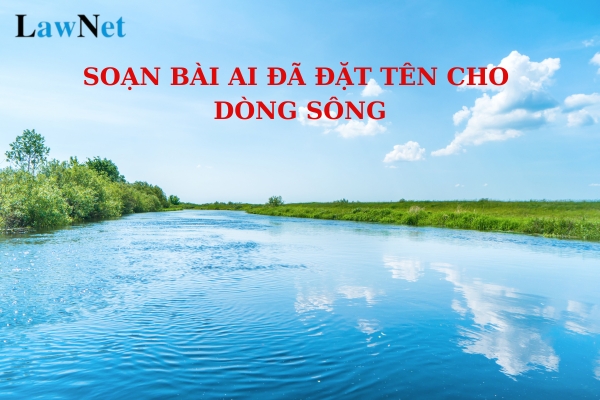What are guidelines on preparing the lesson "Ai đã đặt tên cho dòng sông" for students in Vietnam? Are students in Vietnam allowed to use phones while in class?
What are guidelines on preparing the lesson "Ai đã đặt tên cho dòng sông" for students in Vietnam?
Ai đã đặt tên cho dòng sông" is a work that students will study in the grade 11 Literature curriculum.
Below are guidelines on preparing the lesson "Ai đã đặt tên cho dòng sông" by author Hoang Phu Ngoc Tuong:
|
Guidelines on preparing the lesson "Ai đã đặt tên cho dòng sông"
(including answers to textbook questions)
1. Structure
The work is divided into 2 parts:
- Part 1. From the beginning to the segment “ … chung tình với quê hương xứ sở ”: The journey and beauty of the Perfume River.
- Part 2. The remaining part: Perfume River to the river of cultural history and poetry.
2. In the author's perception, how is the Perfume River's connection with the city of Hue depicted? Analyze some images and details that illustrate this special relationship.
Details and images:
+ Among the beautiful rivers in various countries that I often hear about, it seems only the Perfume River belongs to a single city.
+ The Perfume River continuously changes course, like a conscious love reaching the future meeting place of its city.
+ Facing Hue, the Perfume River doesn't immediately meet Hue but "curves a bow... of love" like a shy, bashful girl.
=> In the author's perception, the Perfume River is intimately, closely, and firmly bonded to the city of Hue.
3. In the text, there are two noteworthy aspects: objective information about the Perfume River and the author's emotions regarding this river. In your opinion, which aspect is more prominent? What basis helps you determine this?
The more prominent aspect is the author's emotion about the river because in the text, Hoang Phu Ngoc Tuong demonstrates:
- An erudite self: Reflected in a rich knowledge base and life experience.
- A talented, sophisticated, romantic self: Reflected in an insightful perspective.
- A sharp observational ability, a rich imagination and associative capability.
- The artistic talent of the writer in depicting the beauty of the Perfume River.
→ All details are carefully selected through the emotionally rich lens of the writer.
4. Share your perception of the significance of the essay’s title. What is noteworthy about the author’s choice of title?
- The title is unique, serving both as a rhetorical question and a statement. The title can imply meanings such as:
+ Reflecting the author's emotional state toward the river.
+ Arousing readers' imagination, visualization, and association.
+ Stimulating curiosity and exploration of the river.
- The rhetorical question addresses the issue of "who named" it. It signifies that the name "Perfume River" contains many fascinating aspects to be understood, along with the mysteries of the river itself to be explored.
5. Analyze some artistic elements that you find distinctive in the excerpt "Ai đã đặt tên cho dòng sông"
Distinctive artistic elements:
- The personification art that makes the Perfume River the central image - a character with its own history, personality, and emotions.
- The blend of factual information about the Perfume River with the writer's deep, abundant emotions about the river.
- The combination of scientific, cultural, and artistic knowledge to highlight the beauty of the Perfume River from various perspectives and angles.
- The artistic expression demonstrated in the language, rich imagery, unexpected comparative associations, and the dynamic rhythm of the prose.
|
Note: This lesson plan is for reference only.

What are guidelines on preparing the lesson "Ai đã đặt tên cho dòng sông" for students in Vietnam? Are students in Vietnam allowed to use phones while in class? (Image from Internet)
Are students in Vietnam allowed to use phones while in class?
Based on clause 4, Article 37 of the regulations on lower secondary schools, upper secondary schools, and schools with multiple educational levels issued along with Circular 32/2020/TT-BGDDT regulating student prohibited behaviors:
Prohibited behaviors for students
- Insulting the honor, dignity, violating the body of teachers, staff, other students, and individuals.
- Cheating in studying, testing, exams, and enrollment.
- Buying, selling, using alcohol, cigarettes, narcotics, other stimulants, fireworks, and substances that cause explosion.
- Using mobile phones or other devices during class that are not for learning purposes and not permitted by the teacher.
- Fighting, disturbing order, or security in schools and public places.
- Using or exchanging cultural products with violent or obscene content; using or playing with toys or games harmful to one's healthy development.
- Engaging in any other legally prohibited behaviors.
Thus, students are allowed to use mobile phones in class only if it serves learning purposes and is permitted by the teacher.
What are regulations on students' conduct and attire in Vietnam?
According to Article 36 of the regulations on lower secondary schools, upper secondary schools, and schools with multiple educational levels issued along with Circular 32/2020/TT-BGDDT students' conduct and attire :
- Student behavior, language, and conduct must be appropriate, respectful, polite, friendly, cultural, and suitable to the ethics and lifestyle of lower secondary school students.
- Student attire must be neat, clean, tidy, age-appropriate, and convenient for learning and activities in school. Depending on the conditions of each school, the principal may decide on student uniforms if it is agreed upon by the school and the school's Parents' Representative Committee.


